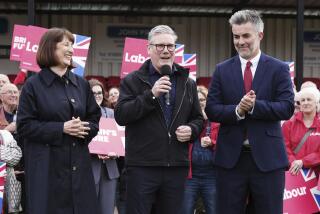Thatcher’s Party Badly Beaten in Local Elections
- Share via
LONDON — Prime Minister Margaret Thatcher’s ruling Conservatives lost heavily to the opposition Labor Party in municipal elections Thursday and dropped one of two parliamentary seats at stake to a centrist coalition.
The Social Democratic-Liberal Party alliance carried the north England parliamentary district of Ryedale by nearly 5,000 votes over the Tories with Labor a poor third. In the last regular election in 1983, the Conservatives carried the district, a traditional stronghold, by 16,100 votes.
The Tories apparently won the second parliamentary by-election, in their north England stronghold of West Derbyshire, but the alliance demanded a recount early today.
With results in from 191 of the 209 councils in England, Wales and Scotland, Labor took control of 16 more councils than the 75 it had held, while the Tories lost 27 of the 72 towns and cities they had held. The alliance gained two districts, doubling its total to four.
With a total of 5,300 council seats up for grabs, the returns showed the Conservatives lost 500 seats, Labor gained 354 and the alliance gained 191.
The council elections constituted the biggest test of opinion before the next general election, which Thatcher has to call by June, 1988. Now in her second five-year term, she is expected to call the election earlier, perhaps in the fall of 1987.
“We’ve lost a lot of votes, a lot of seats,” conceded Kenneth Baker, Thatcher’s environment secretary.
“I don’t think it is a despairing night for the Conservative Party, but it does mean that over the next 18 months to two years, we will have our time cut out putting forward exactly what we stand for,” he said.
Labor leader Neil Kinnock declared his socialists are well on course to oust Thatcher at the next general election.
Among the big cities that fell to Labor were York and Bradford in north England and the port of Bristol in the southwest.
Labor also held the northwest England port of Liverpool, which the alliance had hoped to snatch from hard-line leftist Laborites.
Thursday’s elections were mainly for municipal seats last contested in 1982, when Thatcher was on a wave of popularity because of the victory over Argentina in the Falkland Islands War.
In party standings, latest opinion polls have shown that the Conservatives are backed by about 33% of voters, 6 percentage points behind the Labor Party. The Social Democratic-Liberal Party alliance has trailed with 25%.
The approval rating for Thatcher was down 10 percentage points from the last general election in 1983. She has been dogged by persistent high unemployment, and her tight money policies are blamed for ills ranging from hospital waiting lists to rural bus service cutbacks.
Polls also have shown that a majority of Britons oppose Thatcher’s support for the U.S. attack on Libya.
The left-wing mass circulation Daily Mirror called Thursday a “day of reckoning” and urged voters to back Labor, which it said has shifted toward the center from its radical, leftist platform of 1983.
“If Labor cannot triumph now, it never will,” it said.
Before the voting, control of the municipalities was finely balanced between the two major parties. Labor controlled 75 of the contested councils, the Conservatives 72 and the alliance 2, while the rest were evenly split or run by independents.
In contrast, Thatcher has an impregnable majority in the 650-member House of Commons, where before Thursday’s two by-elections, the Conservatives held 392 seats, Labor held 210 and the alliance 25.
More to Read
Sign up for Essential California
The most important California stories and recommendations in your inbox every morning.
You may occasionally receive promotional content from the Los Angeles Times.













